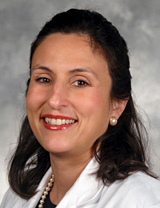Feature Story
Health Center Today, March 8, 2011
Daylight Saving Time - Tips on How to Get a Better Nights Sleep
By Carolyn Pennington

Dr. Jennifer Kanaan
Itís time to spring ahead. Daylight Saving Time takes place on March 13 which means itís time to advance the clocks and lose one hour of precious sleep. The National Sleep Foundation typically uses this opportunity to try to raise awareness about the importance of sleep and the fact that many of us donít get enough of it (March 7 to 13 is National Sleep Awareness Week).
A National Sleep Foundation survey found that 74 percent of adults experiences sleep problems a few nights a week or more. Studies have also shown that sleep deprivation has a serious impact on our health.
ďSleep is as important as diet and exercise in helping people to function and to maintain good health,Ē says Dr. Jennifer Kanaan, pulmonologist and sleep expert at the Health Center. ďUnless we choose to make sleep a priority, Daylight Saving Time will take away yet another hour of healthy sleep.Ē
Tips on how to get a good nightís sleep during the weekend of DST and year-round:
- In the days before the return to Daylight Saving Time, try to go to sleep and awaken 15 minutes earlier each day to adjust to the time change.
- Be cautious not to drive if drowsy on the day or two after the time change, as lost sleep contributes to drowsy driving.
- A short nap the day before the time change can help make up for less sleep, but donít nap within a few hours of your regular bedtime in order to avoid disrupting nighttime sleep.
- On nights after the time change, go to bed at your usual clock
time. You may experience some difficulty falling
asleep, because your brain has not yet adjusted. Therefore it is even more
important to follow the following healthy sleep habits:
- Create a sleep-friendly environment that is dark, cool, comfortable and quiet.
- Have a relaxing routine before bedtime, such as soaking in a hot bath, reading for fun or listening to soothing music.
- Avoid caffeine, nicotine and alcohol for several hours prior to bedtime, as they can disrupt sleep.
- Get up at your usual clock time. Although you may find this a bit difficult, it will help you adjust to the time change.
Free Discovery Series on Sleep Disorders
Tuesday, March 15, 7 p.m., UConn Health Center, Keller Auditorium
Dr. Daniel
McNally, medical director of the Sleep Disorders Center, will discuss the
health benefits of sleep and techniques to overcome problems such as snoring,
insomnia, and sleep apnea. Register online at
http://discoveryseries.uchc.edu
or call 800-535-6232.


